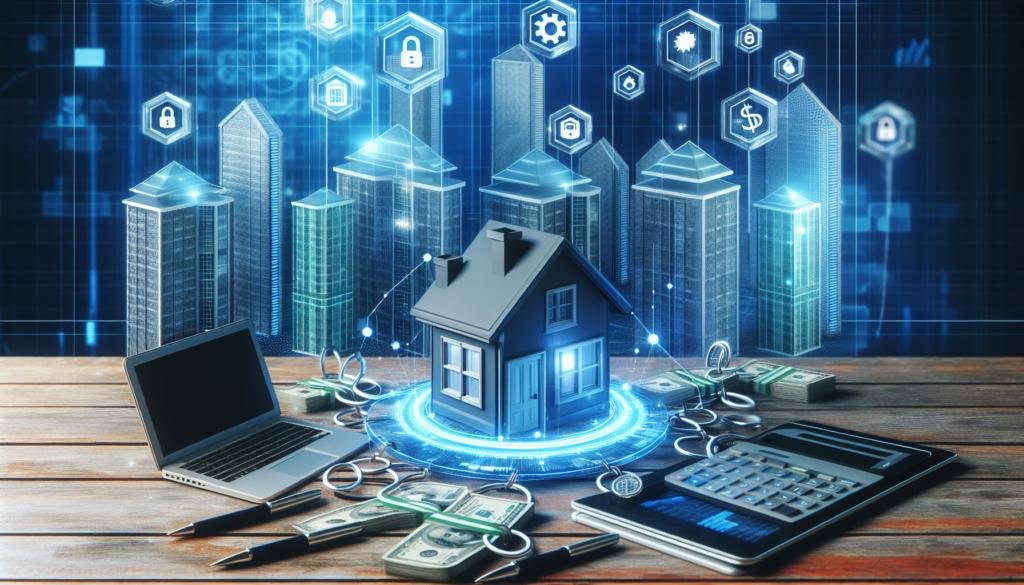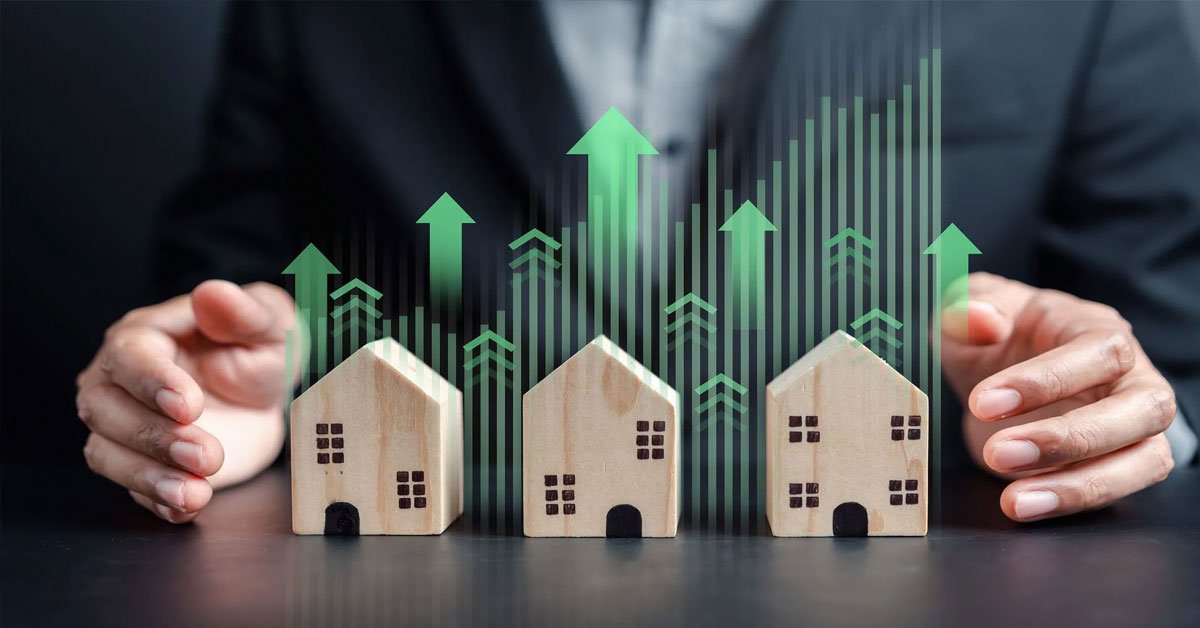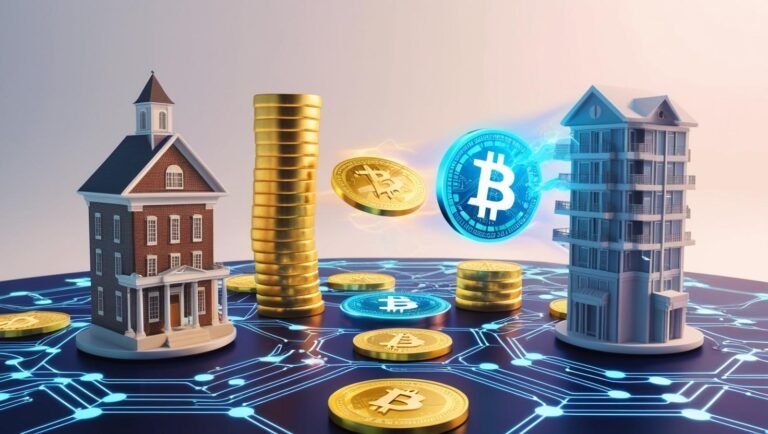Blockchain Transforms Real represents a paradigm shift that’s democratizing property investment, eliminating geographical barriers, and introducing liquidity to historically illiquid assets. Real World Assets (RWA) tokenization is not just a technological innovation—it’s reshaping how we think about property ownership.
Investment accessibility and portfolio diversification. This revolutionary approach allows investors to own fractions of premium real estate properties through blockchain-powered tokens, making million-dollar properties accessible to retail investors with modest budgets.
What Are Real World Assets (RWA) in Blockchain
Real World Assets represent the tokenization of physical, tangible assets on Blockchain Transforms Real. In the context of Blockchain Transforms Real, these digital tokens represent fractional ownership in actual properties, from residential buildings to commercial complexes and industrial facilities. Unlike traditional real estate investment trusts (REITs), RWA tokens provide direct ownership rights and transparent, immutable records of property details, rental income, and market performance.
The blockchain real estate ecosystem encompasses various asset types, including residential properties, commercial buildings, agricultural land, and infrastructure projects. Each tokenized asset maintains a digital twin on the blockchain, containing comprehensive property data, ownership history, and financial performance metrics. This transparency level surpasses traditional real estate investment vehicles, providing investors with real-time access to property analytics and market trends.
Key Components of RWA Real Estate Tokenization
Smart contracts form the backbone of Blockchain Transforms Real operations, automatically executing property transactions, distributing rental income, and managing ownership transfers. These self-executing contracts eliminate intermediaries, reduce costs, and ensure transparent, tamper-proof transaction records. Property management companies integrate with blockchain platforms to provide automated rent collection, maintenance scheduling, and tenant management services.
Decentralized finance protocols enhance the RWA real estate blockchain ecosystem by enabling features like automated lending, yield farming with property tokens, and cross-border investment opportunities. Investors can use their tokenized real estate holdings as collateral for cryptocurrency loans or participate in liquidity pools that generate additional passive income streams.
How RWA Blockchain Real Estate Works

The tokenization of real estate assets begins with property evaluation and legal structuring. Professional real estate firms partner with blockchain platforms to conduct comprehensive property assessments, ensuring accurate valuations and legal compliance. Properties undergo thorough due diligence processes including market analysis, structural inspections, and regulatory compliance verification.
Smart contract deployment creates the digital infrastructure for property tokenization. Each property receives a unique smart contract containing property specifications, ownership rules, revenue distribution mechanisms, and governance protocols. These contracts integrate with oracle networks to receive real-time property valuations, local market data, and regulatory updates.
The Investment Process in RWA Real Estate
Investors access RWA blockchain real estate opportunities through specialized platforms that offer user-friendly interfaces for property discovery, investment analysis, and portfolio management. These platforms provide detailed property information including location data, financial projections, tenant details, and historical performance metrics.
Token purchasing occurs through cryptocurrency transactions, with investors receiving ERC-20 or equivalent tokens representing their proportional property ownership. Minimum investment amounts vary by platform and property, typically ranging from $100 to $1,000, making premium real estate accessible to diverse investor demographics.
Revenue distribution happens automatically through smart contracts, with rental income, property appreciation, and other revenues distributed RWA Blockchain Real Estate holders. Investors receive periodic payments in cryptocurrency or stablecoins, providing steady passive income streams from their blockchain real estate investments.
Benefits of RWA Blockchain Real Estate Investment
Fractional ownership revolutionizes real estate accessibility by allowing investors to purchase small portions of expensive properties. Instead of requiring hundreds of thousands of dollars for traditional property investment, RWA Blockchain Real Estate enables participation with investments as low as $100, democratizing access to premium real estate markets globally.
Global accessibility eliminates geographical restrictions that traditionally limit real estate investment opportunities. Investors from any country can participate in international real estate markets through blockchain platforms, accessing properties in major cities like New York, London, Tokyo, or Dubai without complex visa requirements or local banking relationships.
Enhanced Liquidity and Market Efficiency
Traditional real estate investments suffer Blockchain Transforms Real months or years to sell properties. RWA real estate tokens trade on secondary markets, providing liquidity that matches cryptocurrency trading speeds. Investors can exit positions quickly, rebalance portfolios efficiently, and respond rapidly to market opportunities or personal financial needs.
Transparent pricing emerges from blockchain’s immutable record-keeping and real-time market data integration. Unlike traditional real estate markets with information asymmetries, RWA blockchain platforms provide comprehensive property analytics, market comparisons, and performance metrics accessible to all participants.
Reduced transaction costs result from eliminating traditional intermediaries like brokers, lawyers, and banks. Smart contracts automate many processes that typically require expensive professional services, reducing total investment costs by 2-5% compared to traditional real estate transactions.
Top RWA Blockchain Real Estate Platforms
RealT leads the fractional real estate tokenization space by offering ownership tokens for rental properties across multiple US cities. The platform provides detailed property analytics, automated rent distribution, and secondary market trading for property tokens. RealT’s properties generate consistent rental yields while providing exposure to US real estate appreciation.
Fundrise combines traditional real estate investment trust structures with blockchain technology, offering tokenized real estate funds that provide diversified exposure to commercial and residential properties. The platform’s eREITs and eFunds utilize smart contracts for transparent fee structures and automated dividend distributions.
Propchain focuses on commercial real estate tokenization, enabling fractional ownership of office buildings, retail centers, and industrial facilities. The platform emphasizes institutional-grade properties with stable tenant bases and long-term lease agreements, providing predictable income streams for token holders.
Emerging Platforms and Innovation
Blocksquare develops white-label RWA Blockchain Real Estate tokenization, enabling property developers and investment firms to create their own blockchain-based investment platforms. This approach accelerates RWA adoption by providing turnkey solutions for traditional real estate companies entering the blockchain space.
Vairt specializes in luxury real estate tokenization, offering fractional ownership of premium properties in major metropolitan areas. The platform targets high-net-worth individuals seeking exposure to luxury property markets without full property acquisition requirements.
Challenges and Risks in RWA Real Estate
Regulatory uncertainty poses important challenges for RWA blockchain real estate development. Different jurisdictions maintain varying approaches to cryptocurrency regulation, property tokenization, and cross-border investment rules. Investors must navigate complex legal landscapes that continue evolving as governments develop blockchain-specific legislation.
Technology risks include smart contract vulnerabilities, platform security breaches, and blockchain network instabilities. While blockchain technology provides enhanced security compared to traditional systems, emerging platforms may contain undiscovered vulnerabilities that could affect investor funds or property ownership records.
Market and Liquidity Considerations
Property management quality directly impacts tokenized real estate performance. Unlike traditional real estate where investors can directly oversee property management, RWA token holders depend on platform partners and property management companies to maintain properties, collect rents, and handle tenant relations.
Market volatility affects both cryptocurrency markets and underlying real estate values. RWA token prices may fluctuate based on crypto market sentiment in addition to fundamental property performance, creating additional complexity for investment analysis and portfolio management.
Secondary market liquidity remains limited compared to major cryptocurrency exchanges. While RWA tokens provide enhanced liquidity versus traditional real estate, trading volumes may be insufficient for large position exits during market stress periods.
Future of RWA Blockchain Real Estate
Institutional adoption accelerates as major financial institutions recognize blockchain real estate opportunities. Investment banks, pension funds, and insurance companies are developing strategies to incorporate RWA tokens into traditional investment portfolios, bringing significant capital and credibility to the sector.
Integration with DeFi protocols expands RWA utility beyond simple ownership tokens. Investors can stake property tokens in yield farming protocols, use them as collateral for cryptocurrency loans, or participate in governance votes for property management decisions through decentralized autonomous organizations (DAOs).
Technological Advancement and Scalability
Layer 2 solutions address blockchain scalability challenges that currently limit RWA platform growth. Ethereum’s high transaction fees and slow processing speeds create barriers for small investors, but emerging Layer 2 networks provide faster, cheaper transactions that make micro-investments economically viable.
Cross-chain compatibility enables RWA tokens to move between different blockchain networks, increasing liquidity and reducing dependence on single blockchain ecosystems. This interoperability allows investors to access the best features of multiple blockchain networks while maintaining seamless portfolio management.
AI integration enhances property valuation accuracy and investment analysis through machine learning algorithms that process vast amounts of market data, property characteristics, and economic indicators. These tools provide more accurate pricing models and risk assessments for tokenized real estate investments.
Also Read: Metaverse NFT Sales Surge in August Virtual Worlds Revival
Investment Strategies for RWA Real Estate

Diversification strategies leverage RWA blockchain platforms to build geographically diverse real estate portfolios impossible through traditional investment methods. Investors can own fractions of properties across multiple countries, property types, and market segments while maintaining reasonable minimum investment amounts.
Income-focused approaches target high-yield rental properties available through tokenization platforms. These strategies emphasize consistent cash flow generation through rental income distribution, focusing on properties with stable tenant bases and long-term lease agreements.
Tax Implications and Legal Considerations
Tax treatment of RWA Blockchain Transforms Real investments varies significantly across jurisdictions, with many countries still developing specific guidance for tokenized asset taxation. Investors should consult tax professionals familiar with cryptocurrency and real estate taxation to ensure compliance with local regulations.
Legal ownership structures underlying tokenized properties require careful analysis to understand actual investor rights and protections. Some platforms use trust structures, while others create direct ownership relationships, each carrying different legal implications for investor protections and dispute resolution.
Regulatory Compliance and Due Diligence
KYC/AML requirements apply Blockchain Transforms Real, requiring investor identity verification and source of funds documentation. These compliance measures protect platforms from regulatory violations while providing investor protections against fraudulent activities.
Securities regulations may classify RWA tokens as securities in many jurisdictions, triggering additional compliance requirements and investor protections. Platforms must navigate complex regulatory frameworks while providing transparent disclosure about investment risks and potential returns.
Conclusion
The Blockchain Transforms Real sector represents a fundamental shift toward democratized, transparent, and globally accessible property investment opportunities. Through tokenization, smart contracts, and decentralized finance integration, blockchain technology eliminates traditional barriers that prevented millions of investors from accessing real estate markets.
As institutional adoption accelerates and regulatory frameworks mature, RWA real estate investing will likely become a standard component of diversified investment portfolios. Early adopters who understand the technology, risks, and opportunities in this space position themselves to benefit from this revolutionary approach to real estate investment.
Ready to explore Blockchain Transforms Real opportunities? Research established platforms, start with small investments to understand the technology, and consider consulting with financial advisors familiar with cryptocurrency and real estate investment strategies. The future of real estate investment is here—tokenized, transparent, and accessible to everyone.

